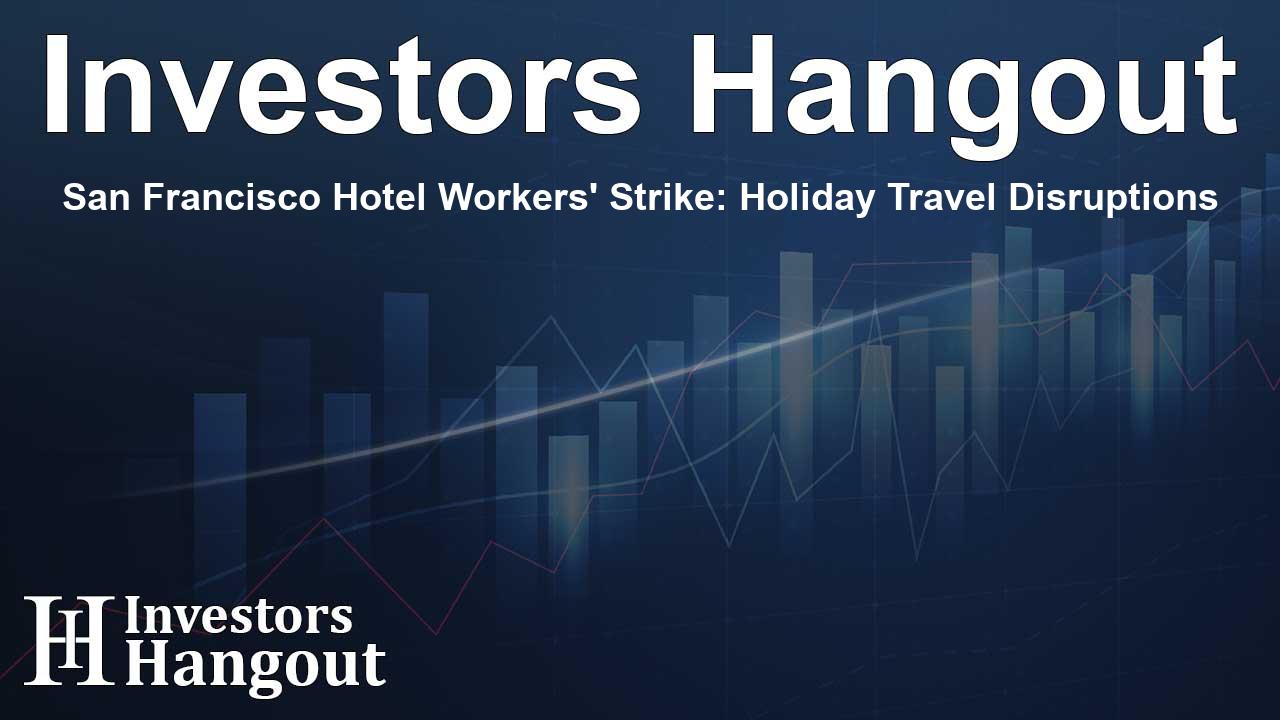San Francisco Hotel Workers' Strike: Holiday Travel Disruptions

Impact of Ongoing Strikes on San Francisco Hotels
Hotel workers’ union UNITE HERE Local 2 has issued a holiday travel alert highlighting ongoing strikes that significantly affect the San Francisco hotel industry. With thousands of employees from major chains like Marriott, Hilton, and Hyatt participating in the strike, many hotels accounting for approximately 27.5% of the city’s hotel rooms are impacted. The striking workers have expressed their determination to continue this action throughout the holiday season and into the new year.
Concerns Raised by Union Regarding Traveler Notifications
Guests Left Uninformed
Many guests are becoming increasingly frustrated as reports indicate that hotels have failed to notify them of ongoing strikes until their arrival. Issues such as overflowing trash bins, unkempt hallways filled with used linens, and closed dining options have led to a disappointing experience for travelers.
Union's Call for Transparency
Due to these disruptions, the union is urging hotels to inform guests if they are booked at an establishment that is currently on strike. They emphasize the need for hotels to provide refunds to affected guests and advocate against dining or lodging at hotels experiencing labor disputes.
Details of the Strike and Affected Hotels
The strike, which commenced several months ago, includes around 2,500 hotel employees across several prestigious locations:
- Grand Hyatt San Francisco
- Hilton San Francisco Union Square
- Palace Hotel (Marriott Luxury Collection)
- San Francisco Marriott Marquis
- San Francisco Marriott Union Square
- Westin St. Francis (Marriott)
Furthermore, the union has authorized additional strikes involving 1,650 workers at eight other hotels in the Bay Area, signaling that disruptions may extend beyond the current scale.
Union Leadership Voices Concerns on Holiday Hospitality
Message from UNITE HERE Leadership
Lizzy Tapia, President of UNITE HERE Local 2, expressed their concerns, stating, "We’re issuing a holiday travel alert because we don’t want this strike to ruin anybody’s holiday season. Months ago, we called on hotels to do right by guests, notify them of strikes, and offer refunds – but unfortunately, they rarely do. Nobody wants to spend the holidays at a hotel with unkempt services."
Personal Reflections from Striking Workers
Elena Duran, a server at Marriott’s Palace Hotel, lamented about the cancellation of cherished events like the Santa Afternoon Tea due to the strike. "The holiday festivities are cancelled this year because all of us staff are on strike," she stressed, emphasizing the resolve among workers to continue until satisfactory resolutions are achieved.
Financial Implications for the City of San Francisco
The union has voiced significant concerns regarding the impact of the hotel’s hardline negotiating tactics on San Francisco's economic recovery. Since the strike's initiation, numerous clients have withdrawn business from the city’s hotels, significantly affecting revenues. Prominent clients have even pledged future business contingent upon the resolution of these labor disputes, highlighting the stakes involved.
Call for Investment in Staff
Workers are asking management to "Bet on SF" by investing in their staff and restoring essential guest services. There is a push for hotels to reopen amenities that not only benefit the guests but also help invigorate the downtown economy. The proposed changes may greatly improve the service environment if management can reach an agreement with the union.
Wider Implications of the Strikes Across the U.S.
The struggle in San Francisco is not isolated. Since Labor Day, over 10,000 hotel workers have initiated strikes across eleven cities, yet San Francisco remains unique in that its hotel workers continue to fight for their rights. The persistence of this labor action reflects a growing movement within the hospitality sector seeking to ensure fair treatment and stable working conditions.
Frequently Asked Questions
What are the main concerns of the hotel workers' union?
The union is primarily concerned with inadequate guest services and lack of transparency from hotels regarding labor disputes.
How many hotels are currently affected by the strikes?
Approximately 27.5% of hotel rooms in San Francisco are affected due to ongoing strikes at various major hotels.
What has the union requested from the hotels?
The union requests that hotels notify guests about strikes and offer refunds to those affected by service disruptions.
What is the response from hotel management to the strikes?
Hotel management has proposed phasing out employees' union health care, which has escalated tensions further.
Are there any future implications for the San Francisco hotel industry?
Yes, if the strike continues, it could deter business from future clients, impacting the hotel's financial stability and recovery efforts.
About Investors Hangout
Investors Hangout is a leading online stock forum for financial discussion and learning, offering a wide range of free tools and resources. It draws in traders of all levels, who exchange market knowledge, investigate trading tactics, and keep an eye on industry developments in real time. Featuring financial articles, stock message boards, quotes, charts, company profiles, and live news updates. Through cooperative learning and a wealth of informational resources, it helps users from novices creating their first portfolios to experts honing their techniques. Join Investors Hangout today: https://investorshangout.com/
Disclaimer: The content of this article is solely for general informational purposes only; it does not represent legal, financial, or investment advice. Investors Hangout does not offer financial advice; the author is not a licensed financial advisor. Consult a qualified advisor before making any financial or investment decisions based on this article. The author's interpretation of publicly available data shapes the opinions presented here; as a result, they should not be taken as advice to purchase, sell, or hold any securities mentioned or any other investments. The author does not guarantee the accuracy, completeness, or timeliness of any material, providing it "as is." Information and market conditions may change; past performance is not indicative of future outcomes. If any of the material offered here is inaccurate, please contact us for corrections.